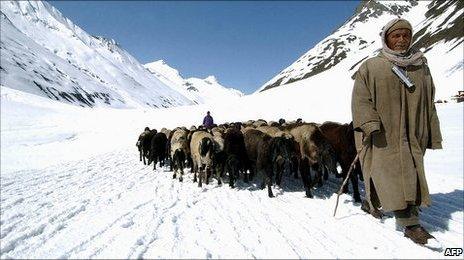Stricter controls urged for the UN's climate body
- Published

The IPCC came under fire after using the wrong date for Himalayan glacier melt
The UN's climate science body needs stricter checks to prevent damage to the organisation's credibility, an independent review has concluded.
The Intergovernmental Panel on Climate Change (IPCC) has faced mounting pressure over errors in its last major assessment of climate science in 2007.
The review said guidelines were needed to ensure IPCC leaders were not seen as advocating specific climate policies.
Dr Rajenda Pachauri: "My hope is that so many investigations into climate science will strengthen public trust"
It also urges transparency and suggests changes to the management of the body.
The IPCC has admitted it made a mistake in its 2007 assessment in asserting that Himalayan glaciers could disappear by 2035. But it says this error did not change the broad picture of man-made climate change.
The review committee stressed that previous IPCC science assessments had been successful overall, but it said the body's response to revelations of errors in its 2007 report had been "slow and inadequate".
Critics have previously called on the IPCC's chair, Dr Rajendra Pachauri, to resign. Responding to the report, Dr Pachauri said he wanted to stay to implement changes at the organisation.
He stressed that none of the reviews set up in the wake of recent climate controversies found flaws with the fundamental science of climate change.
In the past year, climate science and political negotiations aimed at dealing with global warming, such as the Copenhagen summit, have come under unprecedented scrutiny.
In February, the UN panel suggested setting up an independent review, feeling that its 20-year-old rules might need an overhaul. It was overseen by the Inter-Academy Council (IAC), an international umbrella body for science academies.
There was also a sense the UN body might have been ill-equipped to handle the attention in the wake of "Glaciergate" and the release of e-mails hacked from the Climatic Research Unit (CRU) and the the University of East Anglia, UK.
The e-mails issue came to light in November last year, when hundreds of messages between CRU scientists and their peers around the world were posted on the internet, along with other documents.
Critics said the e-mail exchanges revealed an attempt by the researchers to manipulate data and three independent reviews were initiated into the affair. None of these reviews found evidence of scientific malpractice.
This review of the IPCC's workings, external was released at a news conference in New York on Monday. Among the committee's recommendations was that the UN body should appoint an executive director to handle day-to-day operations and speak on behalf of the panel.
It also said the current limit of two six-year terms for the chair of the organisation was too long.
The report favoured the post of IPCC chair and that of the executive director being limited to the term of one climate science assessment.
Dr Harold Shapiro: "Stronger enforcement of existing IPCC procedures will minimise errors"
Dr Pachauri became head of the organisation in 2002 and was re-elected for his second term in 2008.
A conflict of interest charge has also been levelled at Dr Pachauri over his business interests. The IPCC chair has vigorously defended himself over these charges, but the report said the UN organisation needed a robust conflict of interest policy.
Speaking in New York, Harold Shapiro, who led the IAC review, said that although the IPCC's assessment process had "served society well", fundamental changes would help the IPCC continue to perform successfully under a "public microscope".
Dr Shapiro conceded that controversy over errors in climate science assessments had dented the credibility of the process.
'Slow' response
The IAC report concentrates on review processes at the UN body, including the use of non-peer reviewed sources, and quality control on data.
It said the IPCC should establish an executive committee that could include individuals from outside the climate science community in order to enhance credibility and independence.
The IAC committee said processes used by the UN panel to review material in its assessment reports were thorough.
But it said procedures needed tightening to minimise errors. And the IAC urged editors to ensure genuine controversies were reflected and alternative views were accounted for.
Speaking to the BBC, Dr Benny Peiser, director of the Global Warming Policy Foundation, a "sceptical" climate think-tank, welcomed the recommendations, but added: "We really want the IPCC to accept these recommendations and implement them not in 2015, but now. Otherwise, their next report will not be credible."
Mike Hulme, professor of climate science at the University of East Anglia, called the reforms radical and far-reaching.
"If the recommendations are fully implemented, the way the IPCC reports and communicates its findings will be very different in future," he told the BBC.
The IAC says part of the IPCC 2007 report contained statements that were based on little evidence, and urges IPCC authors to make future projections only when there is sufficient support for them.
The use by the IPCC of so-called "grey literature" - that which has not been peer-reviewed or published in scientific journals - has sparked controversy, partly because this type of material was behind the glacier error.
The committee said such literature was often appropriate for inclusion in the IPCC's assessment reports. But it said authors needed to follow the IPCC's guidelines more closely and that the guidelines themselves were too vague.
The report's recommendations are likely to be considered at the IPCC's next plenary meeting in South Korea in October.
- Published14 May 2010
- Published15 June 2010